|
|
|
Sort Order |
|
|
|
Items / Page
|
|
|
|
|
|
|
| Srl | Item |
| 1 |
ID:
177858
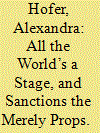

|
|
|
|
|
| Summary/Abstract |
This article argues that sanctions are interactional tools; their interactive nature is evident if these measures are considered as a form of stigmatization, which is the outcome of an interaction between the group imposing the stigma and the actor that is stigmatized. Stigmatized states do not always accept the label that is placed upon them and can adopt strategies to counter or resist stigma. From a symbolic interactionalist perspective, this can be understood as a state’s foreign policy role. Such an approach is illustrated through a study of Russia’s response to being sanctioned by the EU and the US for its policies in the Ukrainian crisis. It is argued that Russian leaders are unlikely to cave into Western pressure because they reject the role of deviant that is placed upon their state and instead adopt the role of the ‘untouchable’ state, which is consistent with Russia’s great power identity. Though the sanctions may enable the EU and the US to activate their roles as normative powers, in the context of the Ukrainian crisis, they have locked the parties into roles that contribute to the crisis’ duration.
|
|
|
|
|
|
|
|
|
|
|
|
|
|
|
|
| 2 |
ID:
139280
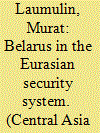

|
|
|
|
|
| Summary/Abstract |
The Republic of Belarus occupies the western periphery of geopolitical Eurasia, by which I mean the post-Soviet space, and is fairly far removed from Central Asia. This distance, however, does not mean that Belarus is safely protected from the security threats emanating from the Central Asian region, and, on the whole, Inner Eurasia. The Belarusian expert community is not indifferent to these problems. Belarus has preserved its military and strategic importance for Russia within the categories of European confrontation of the previous period. Today, it is consistently and actively involved in military integration within the CSTO. The armed forces of Russia and Belarus are tied together by the so-called coalition approach. Civilian and military experts of the Republic of Belarus are studying the hypothetical possibility of its involvement, at the technical level, in the Collective Rapid Reaction Force of the CSTO if and when NATO pullout of Afghanistan sends waves of instability across Central Asia.
|
|
|
|
|
|
|
|
|
|
|
|
|
|
|
|
| 3 |
ID:
138482


|
|
|
|
|
| Summary/Abstract |
The impact of the Ukrainian crisis on the structure of international relations as well as accelerated Russia's turn toward Asia as one of its widely discussed consequences can be hardly overestimated. Reorientation, very much within the concept of the multipolar world, began long before the crisis: Russia was seeking wider cooperation with the APR countries as the future center of world politics and economy; wider investments and high technologies of the most developed countries to whip up the economies of Russia's Asian regions and diversify political and economic cooperation so that to reduce its dependence on the West. Before the clashes in Ukraine, the leading Russian politicians were unanimous in their conviction that closer cooperation with Asia would complement rather than weaken Russia's partner relationships with the U.S. and the EU. Amid the Ukrainian developments the West is cutting down its cooperation with Moscow to force it retreat from its positions; this has woken up the Russian elite to a simple thought that there is no alternative to intensified cooperation with Asia.
|
|
|
|
|
|
|
|
|
|
|
|
|
|
|
|
| 4 |
ID:
139724


|
|
|
|
|
| Summary/Abstract |
TWELVE MONTHS AGO, the Ukrainian crisis invaded the space of international relations; today, a year later, we know much more about its origins and sponsors and have acquired a much clearer idea about its meaning. Ukraine was destined to become a geopolitical battlefield that to a great extent is shaping the global future.
|
|
|
|
|
|
|
|
|
|
|
|
|
|
|
|
| 5 |
ID:
138210
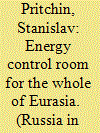

|
|
|
|
|
| Summary/Abstract |
The Ukrainian crisis has brought Russian-European relations to a head, affecting many areas including the energy sector. In response to downright opposition from the European Union, Russia has cancelled the South Stream project. In turn, the European Commission is devising another plan to reduce the EU's dependence on Russia. In particular, it is discussing an idea to establish an EU energy union and work out a unified oil and gas purchasing policy for European companies. A "non-aggression energy pact" could be a way out of this stalemate between the neighbors. This pact would register the current level of cooperation and lay out plans for starting a discussion on a new format of their interaction in the future.
|
|
|
|
|
|
|
|
|
|
|
|
|
|
|
|
| 6 |
ID:
147588


|
|
|
|
|
| Summary/Abstract |
“Finlandisation” has become a buzzword and suggested solution to the on-going Ukrainian crisis. However, in Finland, Finlandisation tends to be a pejorative term because of its negative effects on Finnish domestic politics. Negative effects notwithstanding, Finland’s Cold War experience often appears as a success: it preserved its democratic system, prospered economically, and strengthened its international status. This analysis examines the historical evidence of what role Finlandisation—understood as a policy of collaboration and friendship with the greatest potential security threat to a country’s sovereignty and as a political culture related to that policy—played during the Cold War era. Did the strategy of accommodation go too far and was it superfluous to Finland’s survival and success? In this context, the article also discusses the “dangers” of Finlandisation and the gradual end of the policy.
|
|
|
|
|
|
|
|
|
|
|
|
|
|
|
|
| 7 |
ID:
138057
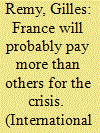

|
|
|
|
|
| Summary/Abstract |
I AM AFRAID that the Ukrainian developments have sucked us into another phase of fundamental changes, the second after the Soviet Union's disintegration twenty years ago. The continent is split which means detrimental and long-term repercussions for Europe. There is no new wall yet there is a crevasse which crosses the territory of a single European civilization called Russia and Europe in which people of Russia no longer feel at home.The Ukrainian crisis brought to the fore what had been going on during the last two decades: numerous political advantages lost amid diplomatic misunderstandings and economic blunders. The West, Europe in particular, is responsible to a great extent for the entanglements: when dealing with Russia Brussels deliberately ignored Russian culture and development dynamics; it proceeded solely from its own ideas about politics and the future order. The Russians, meanwhile, prefer a different development model while Putin is convinced that we are watching the decline of Europe and erosion of European values.
|
|
|
|
|
|
|
|
|
|
|
|
|
|
|
|
| 8 |
ID:
155566
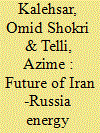

|
|
|
| 9 |
ID:
137167
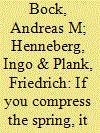

|
|
|
|
|
| Summary/Abstract |
The narrative of an aggressive and neo-imperialist Russia that has dominated analyses of the 2014 Ukrainian crisis lacks theoretical rigour. We argue that a sustainable transformation of the Ukrainian crisis requires an accurate analysis of the context of the conflict, which should include an understanding of Moscow’s perception of the threats to its interests. This policy brief develops a theoretical understanding of the Ukrainian crisis through the lens of Stephen M. Walt’s balance of threat theory. We conclude that a realist analysis will help to explain Russian actions.
|
|
|
|
|
|
|
|
|
|
|
|
|
|
|
|
| 10 |
ID:
137346
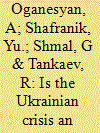

|
|
|
|
|
| Summary/Abstract |
Armen Oganesyan, Editor-in-Chief of International Affairs Today, we will discuss the Ukrainian crisis and its impact on the Russian energy sector. A good deal can be said about that, but it would be desirable if, in analyzing this situation, we would not digress into topics that before long will evidently become irrelevant. Let us look at the situation globally, strategically, in conjunction with geopolitics. Yuri Konstantinovich, you are welcome.
|
|
|
|
|
|
|
|
|
|
|
|
|
|
|
|
| 11 |
ID:
149457
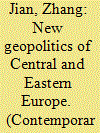

|
|
|
|
|
| Summary/Abstract |
Central and Eastern Europe is located between the East and the West. Big powers have traditionally competed for influence in the region and limited independence. After the Cold War, most of Central and Eastern Europe joined the EU and NATO and focused on political and economic transformations. Mostly these processes went smoothly and the region lost the world’s attention. However, in recent years, as Eurasian geopolitics has changed, especially after the outbreak of the Ukrainian Crisis, competition in the region has grown more intense. This situation is partly due to the region’s geography, history and development, which have traditionally made them targets for other powers to divide between them or to court favor. However, countries in the region no longer want to be puppets, they want to wrest control of their own destiny by playing the powers off against each other, so the geopolitical situation is now presenting a new picture.
|
|
|
|
|
|
|
|
|
|
|
|
|
|
|
|
| 12 |
ID:
137290
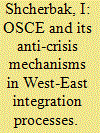

|
|
|
|
|
| Summary/Abstract |
THE RECENT EVENTS in Ukraine and the OSCE's constructive role in settling the crisis in the country's southeast (its active involvement under Swiss chairmanship in drafting and realizing the Geneva and Minsk Agreements, dispatch of OSCE observer mission charged with ceasefire and human rights monitoring) confirmed its relevance as an instrument of international crisis diplomacy indispensable when it comes to dealing with the military and political aspects of the Ukrainian crisis.
|
|
|
|
|
|
|
|
|
|
|
|
|
|
|
|
| 13 |
ID:
138791


|
|
|
|
|
| Summary/Abstract |
We Shall Beat Our Swords Into Plowshares’, reads the inscription on a bronze statue presented by the Soviet Union to the United Nations in 1959, permanently installed in front of UN Headquarters on the East River. Symbolising the struggle for peace, it was sculpted by a Ukrainian, Evgeny Vuchetich. The road to peace after the erection of the monument in New York was bumpy, to say the least, but by 1990 the goal seemed to be in sight.
|
|
|
|
|
|
|
|
|
|
|
|
|
|
|
|
| 14 |
ID:
188469
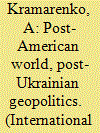

|
|
|
|
|
| Summary/Abstract |
POLITICAL ANALYSTS in many countries, including America, have been discussing a post-American world for years now. The Ukrainian crisis and its impending end allow us to talk about a new kind of geopolitics, since extensive American involvement in this conflict by proxy might mean that the defeat of Kiev will become the defeat of the US/Anglo-Saxons, albeit indirectly - but that is the only possible form of defeat in the era of nuclear confrontation. After the defeat of Napoleon's France and Hitler's Germany, this is the last missing link in the chain of forceful showdowns between the West and Russia. This will bring a new normal to global and European politics ushered in by a period of nonconfrontation during which the Western elites will learn to accept the new reality. This will be complicated by their euphoria over "victory in the Cold War" and the illusion of a "unipolar world" that have shaped the current generation of Western politicians.
|
|
|
|
|
|
|
|
|
|
|
|
|
|
|
|
| 15 |
ID:
132708
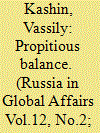

|
|
|
|
|
| Publication |
2014.
|
| Summary/Abstract |
The Ukrainian crisis has demonstrated once again that the global Chinese business empire is growing much faster than Beijing's military-political capabilities. There has again emerged a need for a more active Chinese policy to protect national interests.
|
|
|
|
|
|
|
|
|
|
|
|
|
|
|
|
| 16 |
ID:
137282
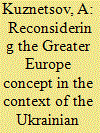

|
|
|
|
|
| Summary/Abstract |
THE UKRAINIAN STORM of 2013-2014 pushed the world dangerously close to Cold War II. The coup and the bloodshed which swept the country were caused by the refusal of the Yanukovich regime to draw closer to the EU no matter what rather than by the fairly acute social, economic and political disagreements inside the country.1 The consecutive packages of anti-Russian sanctions imposed by the European Union and coordinated, to a great extent, with the U.S. and several other non-European allies look very logical in the context of the stalled dialogue between the two key European players. It was in 2012-2013 that many of the expert community recognized an absence of a more or less noticeable progress in moving toward a visa-free regime between the EU and Russia and in settling other important bilateral issues for what it really was: the EU's unwillingness to develop equal partnership with Russia rather than technical discrepancies (according to Brussels). Its attention was riveted to the Eastern Partnership program designed, among other things, to detach CIS countries from Russia and draw new dividing lines in Europe. Is it correct to say that the anti-Russian rhetoric heard from Brussels and its active support of the radical Ukrainian nationalists who came to power in Kiev through an armed coup buried the Greater Europe idea? What is Greater Europe?
|
|
|
|
|
|
|
|
|
|
|
|
|
|
|
|
| 17 |
ID:
192469
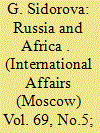

|
|
|
|
|
| Summary/Abstract |
THE holding of the second Russia-Africa Summit in July 2023 in St. Petersburg amid the tough confrontation between the West and Russia was a true feat of Russian diplomacy. The preparation of such a large-scale and significant event required a lot of effort from Russian foreign policy officials. Consistently and convincingly explaining, without typical Anglo-Saxon hysteria and fabrications, Russia's position on international issues, including the Ukraine crisis, and winning African countries over to Russia, which is extending a helping hand to the continent that is home to almost 1.5 billion people, is painstaking and at times exhausting work that remains behind the scenes against the backdrop of positive changes.
|
|
|
|
|
|
|
|
|
|
|
|
|
|
|
|
| 18 |
ID:
138056
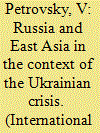

|
|
|
|
|
| Summary/Abstract |
THE SYSTEM of international relations and the world order are being "tested by Ukraine," the situation in which Russia's relations with East Asia are not an exception but a confirmation of the process and an illustration of it.The U.S. Administration resolved to isolate Russia from the rest of the world urged the EU, the rest of the continent and also the East Asian and APR countries to introduce anti-Russian sanctions. In July 2014, at the height of the scandal around the Malaysian "Boeing" shot down over Eastern Ukraine, Peter Harrell, Deputy Assistant Secretary for Counter Threat Finance and Sanctions, travelled far and wide across the region to persuade top officials and leaders of the business communities to side with the United States.
|
|
|
|
|
|
|
|
|
|
|
|
|
|
|
|
| 19 |
ID:
144962


|
|
|
|
|
| Summary/Abstract |
TODAY, the situation in the European security sphere is perhaps at its lowest. The current problems did not emerge yesterday: They have been accumulating for years. The prime cause of the serious cooling of the political climate in Europe was certainly not the Ukraine crisis. The roots of the contradictions that came to a head during the conflict in Ukraine go way back to the 1990s
|
|
|
|
|
|
|
|
|
|
|
|
|
|
|
|
| 20 |
ID:
158199


|
|
|
|
|
| Summary/Abstract |
The Ukrainian crisis resulted in a political confrontation between Russia and the U.S. and Russia's alienation from EU countries. It brought an end to repeated attempts by the Russian Federation to "plug itself into" the Euro-Atlantic community and to become part of the "expanded West." The consequences of this crisis are of fundamental significance for Russia itself, its national self-consciousness and its geographical self-determination. The events in Ukraine have concluded the post-imperial period in Russian history, when Russia pinned its hopes on deep reintegration of the former Soviet republics. Those events have also opened up an era where the Russian Federation is establishing itself as a separate and self-sufficient state, seeing the other post-Soviet countries as close neighbors, but not as parts of a unified geopolitical space headed by Moscow.
|
|
|
|
|
|
|
|
|
|
|
|
|
|
|
|
|
|
|
|
|